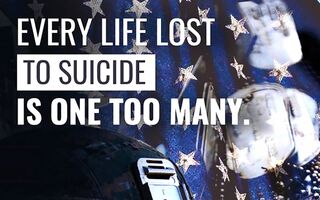Suicide
4 Suicide Prevention Resources for Military Populations
Knowing about these resources could save a life.
Posted September 2, 2020

This blog was updated on 29 August 2022.
Suicide prevention in the military has been spotlighted. The rates in both active duty and veteran populations have risen and we haven’t yet reversed this. The Department of Defense (DoD) and the Veteran’s Administration (VA) are devoting substantial resources to suicide prevention.
In honor of Suicide Prevention Month, I thought it might be a good time to review some of the resources for service members and veterans as we tackle the problem. All of these resources are free and available at any time of the day or night. They range from emergent assistance to resources that connect people to assistance early when problems are more easily solved and treated, as well as educational materials. Please note that service members and veterans can also use all other national suicide prevention resources, however, the following resources are tailored to the military culture and the range of resources that are available to the military population.
Military Crisis Line: Immediate Help in a Crisis
Service members, including reservists and National Guardsmen, and all veterans, as well as the people who care about them, can phone, text, or chat the Military Crisis Line. This resource is available 24/7 and will help service members and veterans experiencing suicidal thoughts and urges, as well as any other type of personal crisis. Dial 988 and then Press 1.
inTransition Program: Assistance in Finding Mental Health Care
The inTransition Program helps military members establish local mental health care and is available to all service members, including reservists, National Guardsmen, and all veterans. This program was created to prevent service members from falling out of mental health care when transitioning from the military to civilian life. The program provides coaching from licensed mental health providers during the transition period and assists the new veteran in re-establishing care in their new location.
Note that the program will serve any service member or veteran from any era who needs to transition to another provider due to a move or other reason, or who needs to establish mental health care, even if it is for the first time. No referral is necessary; individuals may contact the program directly; it is available 24/7. Note that this program does not provide crisis services (use the Military Crisis Line instead).
Make The Connection: Destigmatization Campaign Which Encourages Veterans to Seek Care
Make the Connection is the VA’s public health campaign (Facebook), and connects veterans and their families to resources. The campaign focuses on stories of those who got help and recovered. The goals of this campaigns are to provide education on relevant psychological health topics, encourage help-seeking in veterans who need it, and assist in connecting them to resources.
VA/DoD Clinical Practice Guideline for Assessment and Management of Patients at Risk for Suicide and Associated Resources: Knowledge and Education About What Works to Prevent Suicide
The VA and DoD routinely perform a systematic research review in order to ensure that mental health providers, leaders and family members have access to the current scientific research on what clinical and non-clinical strategies work in order to prevent suicide. The most recent review was completed in 2019, and in 2020 the 7 accompanying support tools were published. The tools distill the scientific language and the lengthy guideline into information that is easy to understand and apply. Tools range from Risk Factors and Warning Signs for Family Members and Caregivers to Lethal Means Counseling: Recommendations for Providers. These are all free and downloadable to anyone.
The above-mentioned resources are by no means exhaustive, but do represent some of the key, tangible resources that can be accessed around-the-clock.
The views presented in this blog post are those of the author and do not reflect the official policy or position of the U.S. Navy, the Defense Health Agency, the Department of Defense, the U.S. Government, or any other institution with which the author is affiliated.
To find a therapist, please visit the Psychology Today Therapy Directory.


